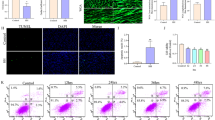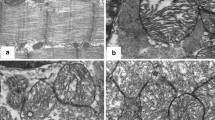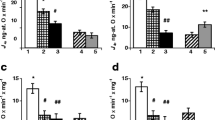Abstract
The present study aimed to investigate the change of proton leak and discuss the role of cerebral uncoupling proteins (UCPs) and its regulatory molecules non-esterified fatty acid (NEFA) in high altitude mitochondrial oxidative phosphorylation deficiency. The model group animals were exposed to acute high altitude hypoxia, and the mitochondrial respiration, protein leak, UCPs abundance/activity and cerebral NEFA concentration were measured. We found that in the model group, cerebral mitochondrial oxidative phosphorylation was severely impaired with decreased ST3 respiration rate and ATP pool. Proton leak kinetics curves demonstrated an increase in proton leak; GTP binding assay pointed out that total cerebral UCPs activity significantly increased; Q-PCR and western blot showed upregulated expression of UCP4 and UCP5. Moreover, cerebral NEFA concentration increased. In conclusion, UCPs mediated proton leak is closely related to cerebral mitochondria oxidative phosphorylation deficiency during acute high altitude hypoxia and NEFA is involved in this signaling pathway.




Similar content being viewed by others
References
Basnyat B, Murdoch DR (2003) High-altitude illness. Lancet 361:1967–1974
Chamberlin ME (2004) Control of oxidative phosphorylation during insect metamorphosis. Am J Physiol Regul Integr Comp Physiol 287:R314–R321
Chan SL, Liu D, Kyriazis GA, Bagsiyao P, Ouyang X, Mattson MP (2006) Mitochondrial uncoupling protein-4 regulates calcium homeostasis and sensitivity to store depletion-induced apoptosis in neural cells. J Biol Chem 281:37391–37403
Chavez JC, Pichiule P, Boero J, Arregui A (1995) Reduced mitochondrial respiration in mouse cerebral cortex during chronic hypoxia. Neurosci Lett 193:169–172
Feil S, Rafael J (1994) Effect of acclimation temperature on the concentration of uncoupling protein and GDP binding in rat brown fat mitochondria. Eur J Biochem 219:681–690
Gilde AJ, van der Lee KA, Willemsen PH, Chinetti G, van der Leij FR, van der Vusse GJ, Staels B, van Bilsen M (2003) Peroxisome proliferator-activated receptor (PPAR) alpha and PPARbeta/delta, but not PPARgamma, modulate the expression of genes involved in cardiac lipid metabolism. Circ Res 92:518–524
Hirasawa A, Itsubo C, Sadakane K, Hara T, Shinagawa S, Koga H, Nose H, Koshimizu TA, Tsujimoto G (2008) Production and characterization of a monoclonal antibody against GPR40 (FFAR1; free fatty acid receptor 1). Biochem Biophys Res Commun 365:22–28
Li Z, Liu W, Kang Z, Lv S, Han C, Yun L, Sun X, Zhang JH (2008) Mechanism of hyperbaric oxygen preconditioning in neonatal hypoxia-ischemia rat model. Brain Res 1196:151–156
Saluja I, Song D, O’Regan MH, Phillis JW (1997) Role of phospholipase A2 in the release of free fatty acids during ischemia-reperfusion in the rat cerebral cortex. Neurosci Lett 233:97–100
Schoonman GG, Sandor PS, Nirkko AC, Lange T, Jaermann T, Dydak U, Kremer C, Ferrari MD, Boesiger P, Baumgartner RW (2008) Hypoxia-induced acute mountain sickness is associated with intracellular cerebral edema: a 3 T magnetic resonance imaging study. J Cereb Blood Flow Metab 28:198–206
Smorodchenko A, Rupprecht A, Sarilova I, Ninnemann O, Brauer AU, Franke K, Schumacher S, Techritz S, Nitsch R, Schuelke M et al (2009) Comparative analysis of uncoupling protein 4 distribution in various tissues under physiological conditions and during development. Biochim Biophys Acta 1788:2309–2319
Starkov AA (2006) Protein-mediated energy-dissipating pathways in mitochondria. Chem Biol Interact 161:57–68
Yang DY, Pan HC, Yen YJ, Wang CC, Chuang YH, Chen SY, Lin SY, Liao SL, Raung SL, Wu CW et al (2007) Detrimental effects of post-treatment with fatty acids on brain injury in ischemic rats. Neurotoxicology 28:1220–1229
Yu XX, Mao W, Zhong A, Schow P, Brush J, Sherwood SW, Adams SH, Pan G (2000) Characterization of novel UCP5/BMCP1 isoforms and differential regulation of UCP4 and UCP5 expression through dietary or temperature manipulation. FASEB J 14:1611–1618
Acknowledgments
This study was supported by the National Nature Science Foundation of China (NSFC, No. 30772455). TPMP+ electrode was set up by professor Ya-Qin Chai of the Southwest University of China.
Conflict of interest
None declared.
Author information
Authors and Affiliations
Corresponding author
Rights and permissions
About this article
Cite this article
Xu, Y., Liu, Y., Xia, C. et al. Evidence for Involvement of Uncoupling Proteins in Cerebral Mitochondrial Oxidative Phosphorylation Deficiency of Rats Exposed to 5,000 m High Altitude. Neurochem Res 38, 282–289 (2013). https://doi.org/10.1007/s11064-012-0917-8
Received:
Revised:
Accepted:
Published:
Issue Date:
DOI: https://doi.org/10.1007/s11064-012-0917-8




